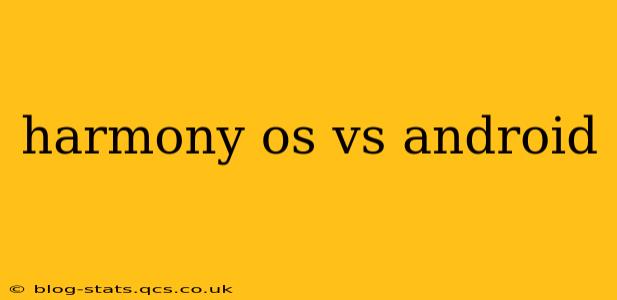The mobile operating system landscape is a dynamic arena, with players constantly vying for dominance. Two prominent contenders are HarmonyOS and Android. While both power a wide range of devices, they boast distinct architectures, features, and philosophies. This in-depth comparison will explore the key differences between HarmonyOS and Android, helping you understand which operating system might be the best fit for your needs.
What is HarmonyOS?
HarmonyOS, developed by Huawei, is a distributed operating system designed to seamlessly connect a wide variety of devices, from smartphones and tablets to wearables, smart home appliances, and even cars. Its key differentiator is its distributed architecture, allowing for smooth data and resource sharing across different devices. This allows for a more integrated and cohesive user experience across the entire ecosystem. HarmonyOS isn't just a mobile OS; it's a platform for a connected world.
What is Android?
Android, developed by Google, is the world's most popular mobile operating system, powering billions of smartphones and tablets worldwide. Its open-source nature has fostered a vibrant ecosystem of apps, customizations, and device manufacturers. While known for its user-friendly interface and vast app library, Android's fragmentation (different versions running on different devices) can sometimes lead to inconsistencies in performance and feature availability.
HarmonyOS vs. Android: Key Differences
Here's a breakdown of the core differences between HarmonyOS and Android:
1. Architecture:
- HarmonyOS: Employs a microkernel architecture, designed for enhanced security and flexibility. This allows for greater control over device resources and facilitates seamless interoperability across different devices.
- Android: Uses a monolithic kernel, which, while established and widely understood, can be less adaptable to the demands of a truly distributed system.
2. App Ecosystem:
- HarmonyOS: While rapidly growing, HarmonyOS's app ecosystem is still smaller than Android's. Huawei is actively working on attracting developers and expanding its app store, but it faces a significant challenge in competing with the established Android app market.
- Android: Boasts the largest app ecosystem in the world, offering a vast library of apps for nearly any conceivable need. This is a major advantage for users looking for choice and diversity.
3. Device Compatibility:
- HarmonyOS: Designed for a wide range of devices, from smartphones and tablets to wearables and smart home appliances, showcasing its distributed nature.
- Android: Primarily focused on smartphones and tablets, although it's also used in some smart TVs and other devices. Its reach is extensive but less broadly integrated than HarmonyOS aims to be.
4. Open Source vs. Proprietary:
- HarmonyOS: While some parts of HarmonyOS are open-source, significant portions remain proprietary. This allows Huawei tighter control over the platform's development and direction.
- Android: Is primarily an open-source project, although Google's version, known as Android Open Source Project (AOSP), is modified significantly for Google's services integration.
5. User Interface:
- HarmonyOS: Features a clean and intuitive interface similar to Android, but with some distinctive visual elements and design choices. It emphasizes ease of use and seamless cross-device interaction.
- Android: Known for its customizable and relatively consistent user interface across different devices, although manufacturers often implement their own skins (customizations).
Frequently Asked Questions (FAQs)
Which OS is better for gaming? Currently, Android offers a significantly larger library of high-quality games, giving it the edge in gaming. HarmonyOS is catching up but needs more time to develop a substantial gaming ecosystem.
Is HarmonyOS better than Android? There isn't a definitive "better" OS. The ideal choice depends on individual needs and preferences. Android offers a larger app library and established ecosystem, while HarmonyOS prioritizes seamless cross-device integration and a distributed architecture.
Can I install Android apps on HarmonyOS? HarmonyOS supports some Android apps through its app store and various compatibility layers, but it's not a full guarantee that every Android app will work flawlessly.
Is HarmonyOS secure? HarmonyOS utilizes a microkernel architecture, which is generally considered more secure than traditional monolithic kernels used in other systems like Android. However, security is an ongoing process and depends on factors beyond just the OS itself.
Which OS is more customizable? While both offer customization, Android generally provides more options, particularly through the use of custom launchers and ROMs. HarmonyOS offers customization but is generally less flexible than Android.
In conclusion, both HarmonyOS and Android offer distinct advantages. Android's mature ecosystem and vast app library make it a powerful choice for many users, while HarmonyOS's ambitious distributed approach aims to redefine how we interact with technology. The best choice ultimately depends on individual priorities and the types of devices you intend to use.
